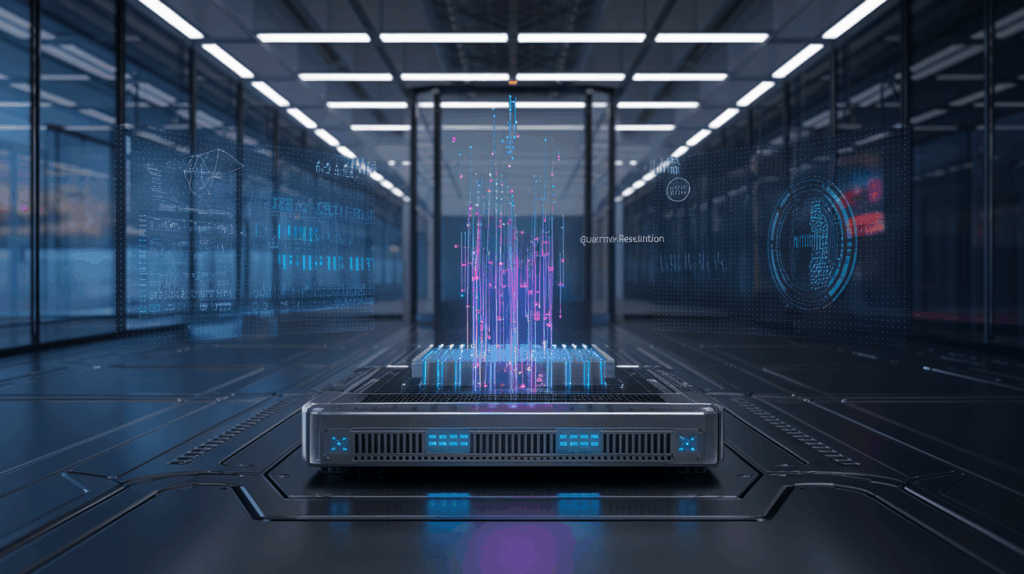Imagine a world where complex problems that would take today’s supercomputers thousands of years to solve could be completed in minutes. This isn’t science fiction—it’s the imminent reality of quantum computing. With quantum technologies projected to generate up to $2 trillion in economic value by 2035, we stand at the precipice of a technological revolution that will transform everything from healthcare to cybersecurity. But this power comes with profound implications: the same quantum capabilities that could enhance our defenses might also render current encryption methods obsolete, exposing sensitive data to unprecedented vulnerabilities.
The quantum revolution is already underway. Microsoft’s Majorana 1 processor, Google’s error-correcting Willow chip, and Japan’s groundbreaking hybrid quantum supercomputer Reimei represent just the beginning. As quantum computing converges with artificial intelligence, we’re racing toward a potential technological singularity that will reshape our digital landscape. Are you prepared for this quantum future? From the exponential acceleration of AI capabilities to the complete transformation of cybersecurity frameworks, the implications will touch every industry and individual. In this post, we’ll explore quantum computing’s revolutionary potential, examine the major players advancing these technologies, and provide practical guidance on how to navigate—and thrive—in the coming quantum era.
Understanding Quantum Computing’s Revolutionary Potential

The Science Behind Quantum Computing: Superposition and Entanglement
Quantum computing represents a fundamental shift from classical computing through its unique operational principles. Unlike traditional systems, quantum computers utilize qubits, which can exist in multiple states simultaneously through a phenomenon called superposition. This capability allows quantum systems to process vast amounts of information in parallel. Additionally, qubits can become entangled with each other, creating powerful correlations that enhance processing capabilities for complex tasks.
These properties enable quantum computers to tackle previously insurmountable challenges in fields such as drug discovery and cryptography, marking a transformative leap in computational power.
How Qubits Outperform Traditional Binary Systems
The power of quantum computing stems from its departure from the binary limitations of classical computers. While traditional bits can only exist as either 0 or 1, qubits leverage superposition to represent multiple states at once. This exponentially increases computing power with each additional qubit added to the system.
By 2025, significant advancements have demonstrated this superiority, with quantum processors containing over 1,000 qubits, as exemplified by IBM’s Condor chip. This represents a massive scaling in quantum computing power that makes certain calculations possible that would be practically unfeasible for even the most powerful classical supercomputers.
The emergence of practical quantum error correction has further enhanced the reliability of quantum calculations, allowing these systems to move from theoretical research to real-world applications in sectors like healthcare and finance.
Recent Breakthroughs in Quantum Research and Development
2025 has been pivotal for quantum computing with several significant breakthroughs:
- Researchers at USC demonstrated clear quantum advantage using quantum annealing, finding near-optimal solutions to complex problems faster than classical supercomputers
- The development of room-temperature quantum computing, reducing operational costs and complexity
- The rise of quantum machine learning showing superior performance across various applications
- Successful experiments in quantum communication paving the way toward an unhackable Quantum Internet
- Democratization of access through quantum cloud services, allowing users to run quantum programs via the cloud
These advancements suggest quantum computing is moving beyond its experimental phase, with routine business applications expected by 2030 and increasing demand for quantum software developers.
With these revolutionary foundations established, let’s examine the major players advancing quantum technology and how they’re shaping this rapidly evolving landscape.
Major Players Advancing Quantum Technology

Microsoft, Google, and IBM’s Quantum Innovations
The quantum race is heating up, and three tech giants are leading the charge.
IBM’s been smashing records with their quantum processors – they recently unveiled their 433-qubit “Osprey” chip, and they’re not stopping there. Their roadmap aims for a mind-blowing 4,000+ qubits by 2025. That’s not just ambitious; it’s revolutionary.
Google made headlines with their “quantum supremacy” claim when their 53-qubit Sycamore processor solved a problem that would take traditional supercomputers thousands of years. While some debate the real-world relevance, nobody’s questioning their commitment to pushing boundaries.
Microsoft took a different path with their topological qubit approach. It’s been a longer road, but if successful, their qubits could be vastly more stable than competitors’ – the holy grail of quantum computing.
Collaborative Initiatives Between Academia and Industry
The quantum revolution isn’t happening in isolation.
The Chicago Quantum Exchange brings together university researchers, national labs, and companies like Intel and JPMorgan Chase. Their shared resources accelerate progress that no single entity could achieve alone.
QuTech, a collaboration between TU Delft and the Netherlands Organisation for Applied Scientific Research, partners with Intel and Microsoft to bridge theoretical research and practical applications.
These partnerships aren’t just about funding – they’re creating quantum talent pipelines. Students work alongside industry professionals, getting hands-on experience with cutting-edge technology while companies scout tomorrow’s quantum workforce.
Economic Impact: The $2 Trillion Opportunity by 2035
Quantum computing isn’t just scientifically fascinating – it’s an economic game-changer.
McKinsey projects quantum technologies could create up to $2 trillion in value by 2035. Early adopters in pharmaceuticals, materials science, and finance stand to capture the lion’s share of this value.
The pharmaceutical industry alone could save billions in drug development costs. Quantum simulations of molecular interactions could cut years off research timelines and dramatically reduce the astronomical costs of bringing new medications to market.
Financial institutions are already investing heavily in quantum capabilities. JP Morgan and Goldman Sachs have dedicated quantum teams working on portfolio optimization and risk assessment algorithms that could revolutionize trading strategies.
Countries are taking notice. China, the US, and the EU have each committed billions to quantum development, recognizing it’s not just about technological leadership – it’s about economic security in the coming decades.
Transformative Applications Across Industries

Now that we have explored the major players advancing quantum technology, including giants like IBM, Google, and Microsoft, let’s examine how these innovations will transform various industries. While quantum computing hardware continues to evolve, forward-thinking organizations are already identifying high-value use cases that could revolutionize their sectors.
Healthcare and Medical Research Advancements
Quantum computing shows significant promise in revolutionizing medical research through its enhanced computational capabilities. Material science applications, particularly relevant to pharmaceutical development, will benefit greatly from quantum computing’s ability to simulate complex molecular interactions. As highlighted by the Quantum Technology and Application Consortium (QUTAC), these simulations can accelerate drug discovery processes by modeling chemical compounds at the quantum level, potentially leading to breakthroughs in treatment development that would be impossible with classical computing methods.
Financial Services and Banking Revolution
The finance industry stands to gain tremendously from quantum computing’s optimization capabilities. Complex financial modeling, risk assessment, and portfolio optimization problems that currently require significant computational resources could be solved more efficiently. According to the reference materials, financial services represent one of the key sectors where quantum computing can have substantial impacts. The ability to process vast amounts of data and analyze market patterns with unprecedented speed could transform investment strategies and financial forecasting, creating new opportunities for innovation in banking and trading.
Enhanced Communications and Data Processing
Quantum technology promises to transform data processing and communications through quantum cryptography and advanced computing capabilities. The development of quantum communications will enable enhanced security protocols that leverage the principles of quantum mechanics. Additionally, quantum computing could revolutionize logistics and supply chain optimization through superior processing capabilities for complex calculations. As noted in the reference content, these advancements could drastically improve efficiency in data-intensive operations across industries.
With these transformative applications gaining momentum across sectors, we must next examine the cybersecurity implications of quantum computing, which presents both unprecedented opportunities and significant challenges for data protection.
The Cybersecurity Double-Edge

Now that we’ve explored the transformative applications of quantum computing across industries, it’s crucial to understand the significant implications this technology has for cybersecurity—presenting both unprecedented opportunities and serious challenges.
Strengthening Defense Capabilities Through Quantum Computing
Quantum computing offers remarkable potential to enhance cybersecurity defenses. Organizations can leverage quantum technology to develop more robust security protocols that outpace traditional computing methods. For instance, quantum computers can perform complex calculations at speeds that would require millennia for conventional supercomputers—Google’s quantum computer demonstrated this by completing a computation in just over three minutes that would take a traditional supercomputer approximately 10,000 years.
Major technology companies are already investing in quantum-enhanced security measures. Apple has introduced its “PQ3” security system for iMessage, specifically designed to counter “harvest now, decrypt later” attacks where malicious actors collect encrypted data to decrypt when quantum computing becomes more accessible. Similarly, Google is developing post-quantum security protocols for its internal communications infrastructure.
The Threat to Current Encryption Methods
While quantum computing strengthens some aspects of cybersecurity, it simultaneously poses an existential threat to current encryption standards. Established cryptographic methods like RSA and ECC rely on mathematical problems that are extremely difficult for classical computers to solve. However, quantum algorithms such as Shor’s algorithm can factor large integers efficiently, potentially rendering these encryption methods obsolete.
This vulnerability creates an urgent need for quantum-resistant solutions. The World Economic Forum, in collaboration with Deloitte, has established a governance framework to facilitate transition to a quantum-secure economy. Their initiative emphasizes the importance of developing post-quantum cryptographic protocols that can withstand attacks from quantum computers.
Real-World Examples of Vulnerability (MGM Breach, Deepfake Fraud)
The reference content points to significant vulnerabilities in our current security infrastructure that could be exacerbated by quantum computing advancements. Various sectors including finance, healthcare, and government communications could face severe consequences if sensitive data protected by current encryption methods becomes compromised.
The WEF is addressing these challenges by developing toolkits to help organizations integrate quantum-cyber protocols into their operations. These resources emphasize governance principles such as cybersecurity, privacy, and accountability. Additionally, the “Bridging the Cyber Skills Gap” initiative connects industry leaders, government agencies, and academic institutions to build a workforce prepared to address emerging quantum security challenges.
With this cybersecurity double-edge in mind, next we’ll explore how quantum computing converges with artificial intelligence to create even more powerful technological capabilities and implications.
The Convergence of Quantum Computing and AI

Having examined the cybersecurity implications of quantum computing, we now turn to perhaps the most exciting frontier: the synergy between quantum computing and artificial intelligence. This powerful convergence, known as Quantum AI, leverages quantum computing’s unique properties to revolutionize computational intelligence beyond what classical systems can achieve.
Accelerating Generative AI Capabilities
AI has spread all over the internet currently and is being used in many regards to make work easier and enhance effeciency like Automated Blog Writing with GravityWrite
However,Quantum AI represents a transformative fusion of quantum computing principles and artificial intelligence methodologies. While traditional computers use binary bits, quantum computers utilize qubits that can represent multiple states simultaneously through superposition. This fundamental difference enables quantum systems to process large volumes of data with unprecedented speed and efficiency.
Specialized quantum algorithms are emerging specifically for AI applications, including Quantum Neural Networks (QNNs) and Quantum Support Vector Machines (QSVMs). These techniques enhance pattern recognition and optimization tasks critical for generative AI. Quantum Machine Learning (QML) algorithms are similarly being developed to improve classification and clustering, with Grover’s Algorithm offering significantly faster search capabilities compared to classical algorithms.
AI-Driven Security Threats in the Quantum Age
The marriage of quantum computing and AI presents substantial security challenges alongside its benefits. As quantum AI accelerates computational capabilities, it may enable more sophisticated security threats. The technology’s ability to process massive datasets and explore multiple solutions simultaneously could potentially empower advanced attacks that current systems aren’t designed to counter.
This represents another dimension of the cybersecurity dilemma introduced by quantum computing—not only will our existing encryption systems be vulnerable, but the tools used to breach security may become exponentially more powerful through quantum-enhanced AI systems.
Potential Path to Technological Singularity
Quantum AI applications span numerous fields with transformative potential. These include optimization in logistics and finance, enhanced natural language processing, accelerated drug discovery through better prediction of molecular interactions, and more accurate financial modeling and market simulations.
Perhaps most significantly, quantum AI could solve previously intractable problems like protein folding predictions and complex real-time optimization challenges. The technology may substantially improve AI training efficiency, potentially creating a pathway toward technological singularity—where AI capabilities accelerate at a pace beyond human comprehension.
However, challenges remain, including current hardware limitations, noise susceptibility leading to computational errors, and the need for accessible quantum algorithms that demonstrably outperform classical approaches.
With these transformative possibilities and challenges in mind, we must next consider how individuals, organizations, and society should prepare for the quantum future that approaches more rapidly than many realize.
Preparing for the Quantum Future

Implementing Zero-Trust Security Frameworks
Quantum computing isn’t just coming—it’s practically at our doorstep. And it’s going to crack our current encryption like an egg.
The most practical step organizations can take right now? Adopting zero-trust security frameworks.
Zero-trust isn’t just a buzzword. It’s a complete mindset shift from “trust but verify” to “never trust, always verify.” Every user, device, and connection is treated as potentially compromised—because in a quantum world, they very well might be.
Here’s what implementing zero-trust actually looks like:
- Continuous authentication (not just at login)
- Micro-segmentation of networks
- Least-privilege access for all users
- Real-time monitoring and analytics
Developing Deep Observability of Network Traffic
You can’t protect what you can’t see. Deep observability gives you x-ray vision into your network traffic.
Think of it as quantum-proofing your visibility capabilities. When quantum computers can crack encryption in seconds, you need to spot unusual patterns instantly.
Most organizations are flying blind right now. They monitor less than 50% of their network traffic effectively. That won’t cut it when quantum attacks hit.
Start by:
- Deploying AI-powered traffic analysis tools
- Creating quantum-resistant traffic baselines
- Implementing behavioral analysis systems
- Setting up quantum-aware monitoring stations
Public-Private Collaboration for Quantum-Ready Security Policies
The quantum security challenge is too big for any single organization to solve alone.
Government agencies, private tech companies, and academic institutions need to stop operating in silos. The companies building quantum computers need to work with the security experts who understand the threats.
We’re seeing promising collaborations forming:
- NIST’s Post-Quantum Cryptography standardization process
- The Quantum Economic Development Consortium (QED-C)
- EU’s Quantum Flagship initiative
These partnerships are creating the quantum-ready frameworks that will protect our digital infrastructure. The organizations joining these efforts now will have a massive head start when quantum computing hits the mainstream.

The Quantum Revolution Is Coming
Quantum computing stands at the precipice of transforming our world—from revolutionizing cybersecurity and healthcare to fundamentally altering how we process information. With major players like Microsoft, Google, IBM, and Intel investing heavily in quantum technologies, we’re witnessing the early stages of a computing paradigm that could generate up to $2 trillion in economic value by 2035. The convergence of quantum computing with AI will only accelerate these changes, potentially leading to computational capabilities previously thought impossible.
The time to prepare is now. Organizations should adopt dynamic security approaches including Zero-Trust frameworks and enhanced observability tools to address the double-edged sword of quantum’s cryptographic implications. Whether you’re in healthcare, finance, or technology, understanding quantum’s potential and actively participating in its development will be crucial for future success. As quantum and AI continue their remarkable convergence, those who position themselves at this intersection will help shape the next technological revolution—one qubit at a time.
More Articles: How to create .NET Application using Blazor

Pingback: Demystifying 6G: What to Expect from the Next-Gen Network 2025